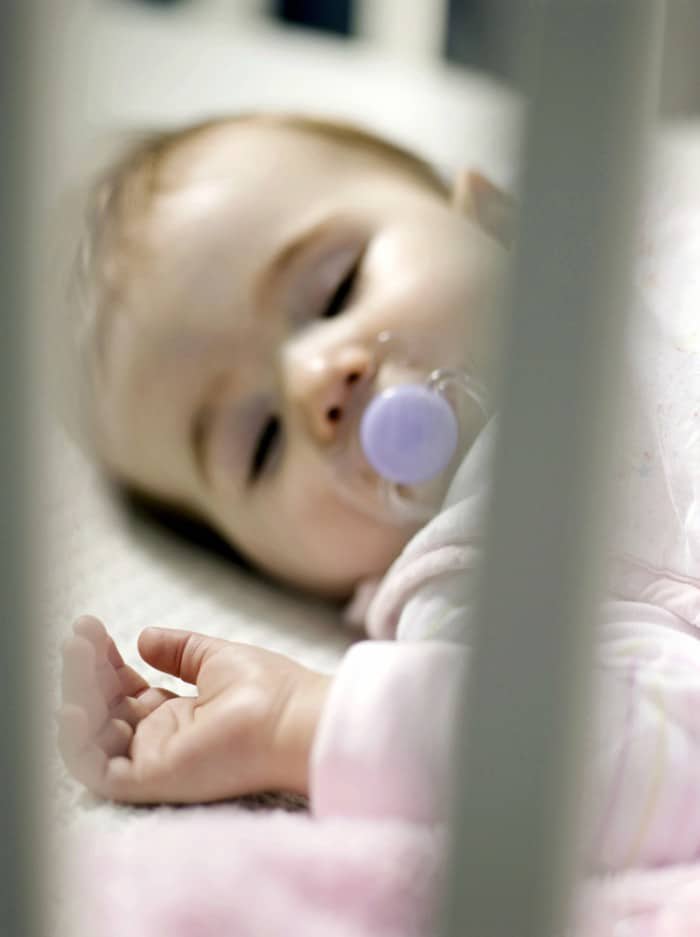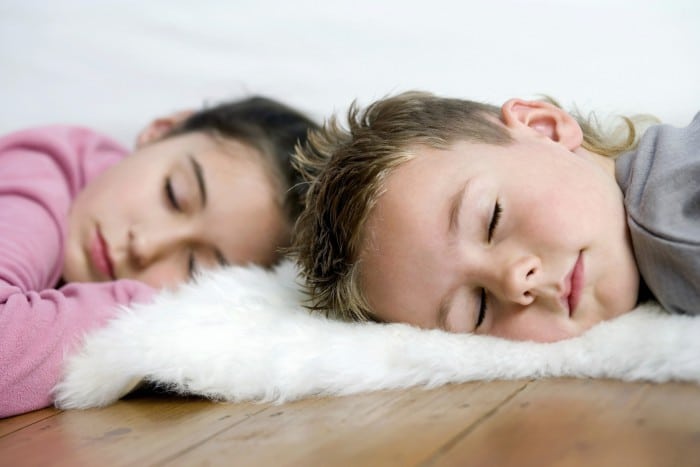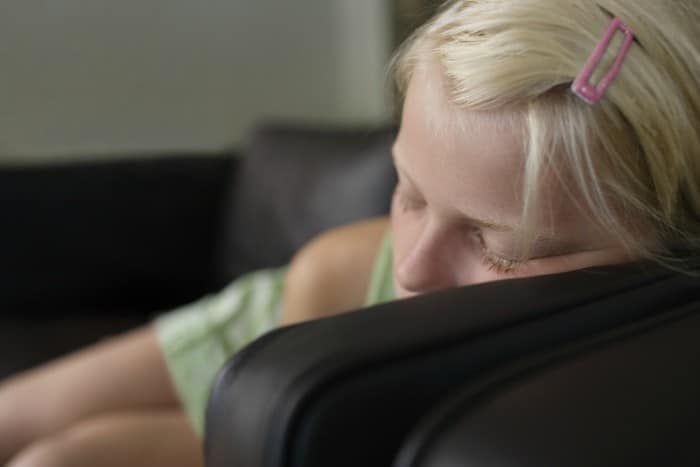What are the signs and symptoms of sleep deprivation in children? Kids require more sleep than adults and without adequate sleep, your child is at risk for obesity, behavior problems, emotional instability, learning problems, depression, or other health problems. The lowest number on the guide below is the minimum amount of hours that your child should be getting on a daily basis.
Disclosure: Please seek advice from your child pediatrician if you have any further questions about sleep deprivation in children. This information is based on my own experience and research.
Let’s take a look at ways to prevent symptoms of sleep deprivation in children and keep your child healthy. Also, check out the new recommended number of hours your child should be sleeping.

- Newborns (0-3 months): Sleep range narrowed to 14-17 hours each day (previously it was 12-18 hours).
- Infants (4-11 months): Sleep range widened two hours to 12-15 hours each day (previously it was 14-15 hours).
- Toddlers (1-2 years): Sleep range widened by one hour to 11-14 hours each day (previously it was 12-14).
- Preschoolers (3-5): Sleep range widened by one hour to 10-13 hours each day (previously 11-13).
- School-age children (6-13): Sleep range widened by one hour to 9-11 hours each day (previously 10-11).
- Teenagers (14-17): Sleep range widened by one hour to 8-10 hours each day (previously 8.5-9.5)
- Younger adults (18-25): Sleep range is 7-9 hours each day (new age category).
- Adults (26-64): Sleep range did not change and remains 7-9 hours
- Older Adults (65+): Sleep range is 7-8 hours each day. (new age category).
- Pregnant Women: during the first three months of pregnancy you will likely need several more hours of sleep than usual.
With today’s busy lifestyle, many children aren’t getting the proper amount of sleep required for them to function. Sleep deprivation symptoms in children are often hard to recognize and may even go unnoticed by parents. Please visit The National Sleep Foundation to learn the signs and symptoms of sleep deprivation in children (click to read the article and don’t worry we save your spot here).
What Is Sleep Debt?
Our busy lifestyles can interfere with our sleep habits and your children can suffer the consequences of sleep debt too. Sleep debt is similar to overdrawing your bank account but your body will eventually demand that repayment too. Your body begins producing less energy and it even lowers your immune system leaving your child vulnerable to potential illnesses such as strep throat (catching it from a classmate), stomach virus, colds, or even the flu.

Adults who say that they can function properly with 5 or 6 hours of sleep at night tend to live in a state of sleep debt. People who function on less than the recommended suggestion often forget what it feels like when they wake up feeling fully rested. It is hard to notice abnormal symptoms of sleep debt when you consider the symptoms as normal. Sleep debt can cause problems with your judgment and decision-making skills, slows down your reaction time, and other functions may be impaired as well.
How to Prevent Sleep Deprivation in Children
Prevention is the easiest way to prevent suffering from the symptoms of sleep deprivation in children. With our busy lifestyles, I get it when things come up and the kids end up staying up past their bed time. But their sleep quality shouldn’t have to suffer long-term.
Keep a Consistent Sleep Schedule
I’m guilty of breaking this rule and need to work on it, especially during the summer months. Keeping a consistent schedule makes it easier for your child to go to sleep and wake up around the same time of day, including on weekends, holiday, and during the summer months.
Plus, it helps your child set their bodies natural circadian rhythm. The circadian rhythm is your body’s internal clock that tells your body when you should go to sleep and when to wake up, ie waking up before your alarm goes off. Your child’s body is throw off whenever there is an inconsistent bedtime.
Find a Bedtime Routine That Works for Your Child
As a parent, you will quickly learn that children are great at stalling and finding ways to stay up later if you allow it. We suggest that you start winding your kids down for the day at least 30 minutes before their scheduled bedtime. This gives your child ample time to brush their teeth, use the bathroom, get a drink of water, and give hugs and kisses to everyone before climbing into bed for the night. If my child manages, to get in bed a few minutes early, I do allow them to quietly lay down without closing their eyes right away.

Make Sure Your Child’s Room is Dark and Quiet
During the summertime, it is likely that it is still light outside when it is time for your child to go to bed. Natural daylight can make going to sleep early a struggle for children because they naturally want to stay up and play. Try adding dark or even blackout curtains if your child has a hard time falling asleep during the summer months.
Turn Off Electronics an Hour Before Bedtime
Technology can be blamed for a wide variety of sleep disorders. Computer screens, television, tablets, and smartphones all emit blue light. Blue light can disrupt your sleep schedule because blue wavelengths are known to boost attention, reaction, and even moods. When blue light is used at night, your brain is receiving messages and your brain suppresses the secretion of melatonin.
Melatonin is a hormone that is naturally produced and when the brain secretes this hormone it tells your body it is time for bed. Blue light disrupts this process and can cause your child to stay awake at night.
It is best to shut off all electronics an hour before bedtime so that your child’s body has a chance to wind down. You can also look to see if your child’s device has a feature where you can turn off the blue light.
Make Time for Exercise
According to the CDC, children need a minimum of one hour of moderate or vigorous exercise on a daily basis. Children in today’s modern world aren’t active enough. Between safety concerns and access to more electronics, kids are forced to stay indoors and aren’t free to go outside to play or run around.
Parents it isn’t fair to expect your child to get all of their daily exercise goals met while at school. If you aren’t comfortable sending your child outside to play without strict supervision, I highly recommend that you enroll your child in their favorite sport or make time for them to go outside regularly.

Limit Caffeine
Caffeine is found in food and drinks that our kids are consuming on a daily basis. It is considered a drug because it is a stimulant that acts on the central nervous system. Kid’s don’t need to consume large quantities of caffeine and remember that it doesn’t take as much caffeine to cause your child to experience the side effects. Drinking too much caffeine can cause the following symptoms:
- jitters and nervousness
- upset stomach
- headaches
- difficulty concentrating
- trouble sleeping
- faster heart rate
- higher blood pressure
The easiest way to control your child’s caffeine intake is to eliminate soda. Soda contains empty calories and filled with sugar. It is better to offer your child water, milk, flavored seltzer, use sugar-free flavoring packets in water, or 100% juice in small quantities. Treating soda as an occasional treat isn’t going to harm your child. Don’t forget to check nutrition labels to ensure food or drinks don’t contain caffeine before giving them to your child. Caffeine can cause sleep deprivation in children.
Do your kid’s get plenty of sleep on a regular basis? Kids require more sleep than adults and it is important that they are getting the recommended amount of sleep (see above) on a daily basis. Even though most sleep deprivation symptoms aren’t as noticeable in children, they are affected and can accumulate a sleep debt. Prevention is the best way to help your kids avoid sleep deprivation.









I always work to make sure my kids get enough sleep. On school nights they are not allowed on electronics after 9, so that helps.
We have fallen out of routine since the summer. We are going to have to get into a routine when school is back in order to make sure that the kids have enough sleep.
I can tell when my youngest is over tired and didn’t sleep well for a night or two simply by looking at his eyes. He gets huge dark circles under his eyes and is crankier than normal. My middle is argumentative if he hasn’t been sleeping well and my teen is the same. I personally haven’t dealt with actual sleep deprivation in kids in a long time though, great tips to help parents!
My son’s sleeping schedule got messed up this summer, but he’ll go back to his usual routine when school is back. But he gets at least 8 hours of sleep everyday.
My girls have always gotten enough sleep, but I notice that my niece, who we just gained custody of, has never had a set sleep schedule and is always tired. It’s been quite the task trying to retrain her to ensure she’s getting the recommended amount of sleep each night.
yes yes yes – def can tell when my littles are just over tired when they start to whine – i can’t deal with it nor do i really hate being exhausted too!
This is great info. I love the chart…I had a hunch my oldest daughter did not get enough rest and has way too much stress with her classes at school. Now I know after seeing the recommendations that we need to work on her sleep schedule.
I have to admit, my kids don’t really have a routine now that they are older. But, they get enough sleep.
This is some really great information about sleep! I love that you narrowed down the amount of sleep needed for the different ages, as well as how to prevent sleep deprivation in children.
These are some great tips for things to look out for, for those with children, or who work with them. I am sure sleep deprivation can have so many detrimental effects.
These are good tips to help prevent sleep deprivation in children. My kids had good sleeping habits until they were teenagers. Luckily, they all seem to have outgrown those bad habits.